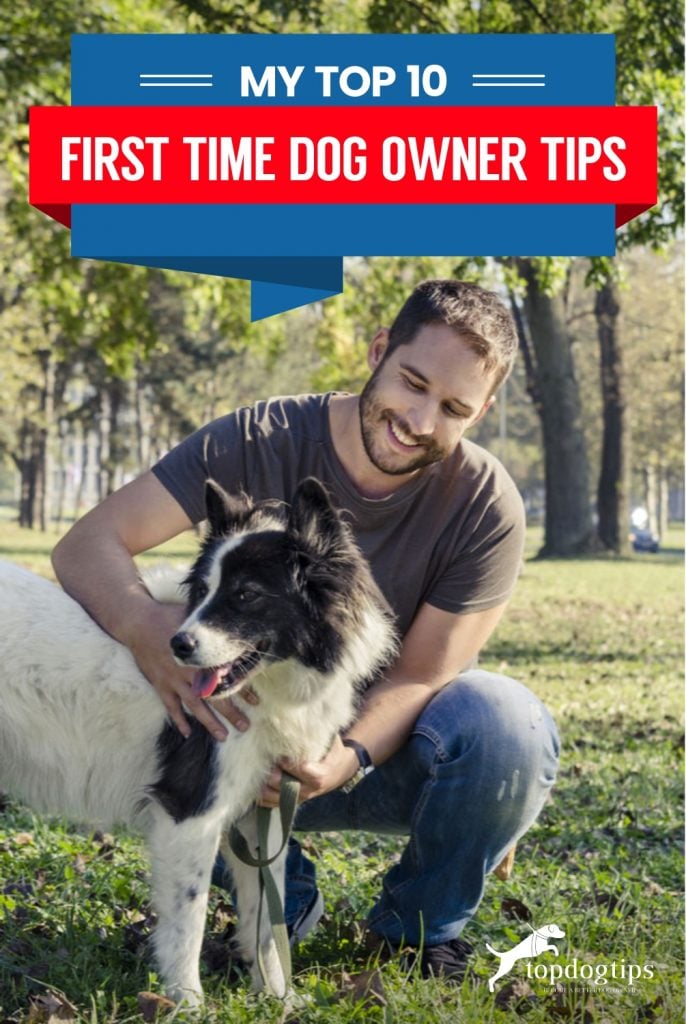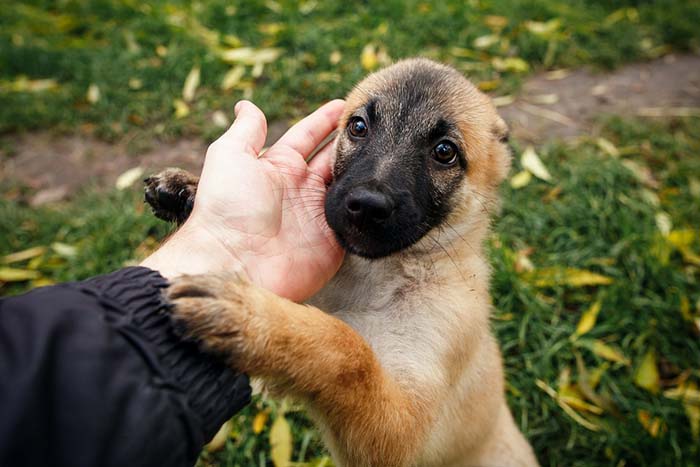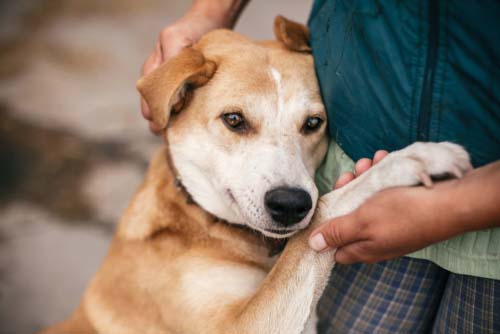Table of Contents
I‘ve been a dog owner for over 20 years and have adopted and rescued many, many dogs in the past. Owning a dog is an exciting adventure but also a big responsibility. Your planning should begin months before you bring your new pet home. Whether you're adopting an adult dog or bringing home a new puppy, following my top 10 first-time dog owner tips will help you provide the best care possible for your new furry family member.
If You're About to Adopt a Dog…
You're about to be responsible for feeding and caring for another living being. It's something that you should not take lightly because many other pet owners sadly already do. But, figuring out how to best care for a new dog is not the first step. Before you do anything else, be sure that you choose the right dog.
- What breed of dog will best suit your lifestyle?
- Will a small or large breed be the best fit for your home and situation?
- Do you want an active dog or a snuggle bug that will lie with you on the couch?
Such questions are just the tip of the iceberg when it comes to choosing the best dog. You could take an online quiz, talk to other pet owners, do online research on the best and worst breeds for first time owners and read books on the subject. Once you've chosen a breed that you think will fit in nicely in your home, it's time to prepare for your new pet.
Figure out what responsibilities will be involved in your new dog care and who will perform each task, especially if you're adopting as a couple. Discuss the new addition with your entire family and make sure everyone understands what is involved in caring for dogs.
Consider doing research on the most important aspects of pet care. Literature on dog training, basics of grooming and key dog health/care will be extremely helpful to first time dog owners. If you're sure that you're ready to take on the responsibility of a dog, below first time dog owner tips will make things a little easier for you and your new pup.
My Top 10 First-Time Dog Owner Tips
1. Get Off to a Good Start
One of the most important reasons to begin your research before you bring your new dog home is to ensure that you get started on the right foot immediately. Some owners believe that they should give a new dog a few days to adjust to their new environment before beginning training or starting a routine. This is completely wrong.
You need to begin working with your dog as soon as you bring them home. Creating a routine and setting a schedule is very important, so your dog knows what to expect. You should have a set feeding, bathroom and nighttime routine. Of course, this won't happen on day one. However, you can begin gradually working your dog into a regular routine.
Training should also begin as soon as you bring your dog home. You should decide on the training method you want to use before your new pet arrives and start with crucial tricks and commands first. Dog training should be consistent from day one. This way, your dog won't develop any bad habits and will understand that previous bad habits will not be tolerated in this new home.
2. Visit the Veterinarian ASAP
One of the most important first-time dog owner tips is to take your pet to the vet for a checkup as soon as you can. You'll share any history or information that you have about the dog, and your vet will do a full examination. If you've adopted a young dog, puppy shots may be required.
A few things to discuss during your first veterinarian visit include:
- spaying/neutering (if necessary)
- flea and tick prevention
- blood work to check for health issues (if needed)
- appropriate diet
If you adopt a dog from a shelter, he will be up-to-date on vaccinations. If not, your vet will be able to give Fido the necessary shots that he needs. They can also help answer any first time dog owner questions that you may have.
3. Educate Yourself
If you didn't do the appropriate research before bringing a new dog home, this is the time to do it. You need to educate yourself on your dog's breed and age expectations. For example, some breeds are genetically more susceptible to certain health conditions and others have more energy compared to lazier breeds.
Learning about a dog's breed will help you choose the right diet for your new pet and guide you in creating a grooming schedule for them. The more you know about your dog's breed, the less surprises you'll have down the road.
A dog's age is also an important factor to consider. Senior dogs and puppies have much more specific care requirements than the average adult dog, but they also have their own advantages over puppies. A dog's daily care and routine may need to be altered to meet these and other requirements.
4. Choose the Right Diet
When it comes to feeding a new dog, choosing the right food may be more difficult than you think. There are a wide range of dog food brands available, which makes the selection process extremely overwhelming.
Commercial dog food diets range from raw food to kibble, and the options don't stop there. You can choose grain-free food, a vegan diet or even decide to make your own homemade dog food.
It's important to know what diet your dog was eating before you adopted him. Ask his previous owner, breeder or shelter operator about the brand and type of diet that your dog has been eating. If you'd like to switch to a new food, consult your veterinarian.
Your vet will evaluate your dog to help you decide which dog food diet will offer your pet the best nutrition. They can guide you in choosing the best brand for your dog and make suggestions about a feeding schedule, serving size, and how best to transition your dog to a new diet.
5. Give the Dog Some Space
Another good first time dog owner tip is to invest in a dog crate and/or bed for your pet. This will give your pooch some space of his own where he can go to relax stress-free, and escape the hustle and bustle of your home.
Dog crates keep animals safe and offer a secure place (similar to a den) where he can go if he's not 100% house trained yet. Crate training is highly recommended by professional dog trainers, veterinarians and other experts in the pet industry. For more information on the benefits of crate training, check out these resources:
- Puppy Crate Training Schedule
- 16 Tips for Crate Training A Dog
- 20 Tips for Crate Training A Puppy
- 5 Mistakes of Crate Training Dogs (and how to fix them)
Providing your dog with his own bed is also important. He will sleep better if he has his own space, and he will begin to see his bed as an oasis where he can go to rest. Dog beds also provide much-needed support for your pup's bones and joints. They are much better for your dog's health than a blanket on the floor.
6. Nighttime Routine
As I mentioned above, a routine for dogs is important. The most crucial schedule to establish – for your dog's well-being and your own sanity – is a nighttime routine. Getting your dog to sleep through the night may be a challenge at first, especially with puppies, but once he's sleeping soundly, things will be much better for both of you.
Whether you crate train your dog, train him to sleep on his own bed or allow him to sleep in bed with you, get a routine down. Have your dog go to sleep around the same time each night, and get him up around the same time in the morning. If your dog cannot hold his bladder/bowels all night, take him out for a potty break around the same time too.
7. Dog Training Classes are a MUST
There are puppy and adult dog training classes available in every area. You can also look for online training classes if that would be a good option for you (though it's usually not recommended). There are also training classes for senior dogs to teach basic obedience for the owner and the dog.
If your dog already knows the basic commands, there are other training options available for advanced tricks, agility work, dock jumping and many other fun and useful activities. No matter what type of training you sign up for, it will greatly benefit your relationship with the new dog.
Aside from the behavioral benefits of dog training, it's also a fun activity for both you. Plus, training reinforces your dominance as a dog handler and fosters the bond between you and your pup.
8. Know the Rules and Laws
Due diligence is always rewarded when it comes to making sure you can have your dog where you are living. In a home you own things are different than an apartment or rental. Get all needed permissions in writing before bringing your pet home.
If you live in a neighborhood governed by a homeowner's association, there may be a number of rules that will need to be followed; they're slightly infamous for that. For example, they may have rules about the type of fencing you can use to contain your dog in the yard or the amount of barking that will be tolerated.
Observe the laws for your town for dog registration and rabies vaccines. Both are generally required everywhere in the U.S. Some towns (and many homeowner's associations) have bans on specific breeds too, so check into this before getting a canine companion. Your homeowner's insurance may also ban certain breeds, so it's best to check with the company that provides your insurance.
9. Set Up Your Home for Success
Dog-proofing your home is essential before or right after you adopt a new dog. It is the best way to keep your new pet safe and your home in tact.
Like small children, dogs learn about their environment by exploring, investigating and testing everything around. They will use their paws and mouths to see how things work in their new home. Unfortunately, this can also get them into a lot of trouble and accidents.
Read more about how to puppy-proof your home and ideally you can do this in the very first few days after adopting a dog. This will keep everybody safer.
10. Have a Support System in Place
Raising a dog takes a village, and you're going to need one! Before you bring your new dog home, you should set up a support system. You'll need to research and find a veterinarian, dog groomer, pet sitter, trainer and any other experts that may be able to help you in your journey as a new dog owner.
It's important to think about your needs and your dog's needs. This is where your research will come in handy. For example, if you've adopted a breed known for having separation anxiety, you may want to hire a pet sitter. If the shelter tells you that the dog you're adopting has behavior issues, you may want to have a trainer on standby after you bring your new pup home.
Following these first time dog owner tips is sure to make your dog care adventure much easier and more fun. I've been a pet owner for more than 20 years, and I've got a lot of experience with adopting new dogs. These tips have definitely helped me, and I hope they can be beneficial to you too.
READ NEXT: 5 Things Owners Wish They Knew Before Adopting A Dog


















